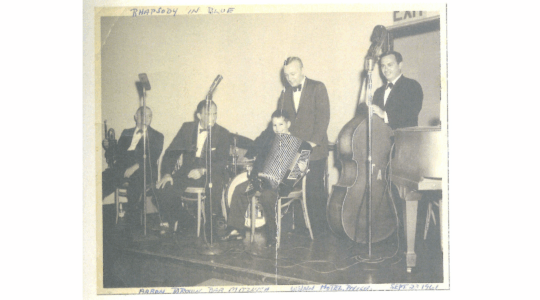WASHINGTON (JTA) — Presbyterians who engage in dialogue with Jewish groups are scrambling to undo what they say is the damage caused by a congregational study guide assailing Zionism distributed by a group affiliated with their denomination.
The guide, “Zionism Unsettled,” posits that the Israeli-Palestinian conflict is fueled by a “pathology inherent in Zionism” and rejects theologies — Christian and Jewish — that uphold Zionism.

The Israel/Palestine Mission Network of the Presbyterian Church (U.S.A.) released a study guide titled “Zionism Unsettled” with a companion DVD.
Jewish groups expressed outrage at the guide released last month by the Israel/Palestine Mission Network of the Presbyterian Church (U.S.A.). The president of the Jewish Council for Public Affairs, Rabbi Steve Gutow, called the guide “worthy of a hate group, not a prominent American church.”
Presbyterians involved in Jewish-Christian dialogue expressed dismay over the guide in equally strong terms.
“This document purports to be about love but it actually expresses demonization, distortion and imbalance,” the Rev. Katharine Rhodes Henderson, the president of New York’s Auburn Theological Seminary, a Presbyterian-affiliated institution, wrote in a statement issued to JTA.
Some Presbyterians involved in Jewish-Christian dialogue say they are pressing the leadership of their church to renounce the study guide and plan to raise the issue at their mainline Protestant denomination’s General Assembly this summer.
The immediate task for members of their church, many Presbyterians reached by JTA said, is to reassure Jews that the guide does not reflect the broader church.
“My first response to my friends in the Jewish community with whom I associate on a monthly basis in a Jewish-Presbyterian dialogue group is to assure them that this does not represent even close to a majority opinion,” said the Rev. Mike Cole, a Houston-area Presbyterian leader.
One factor inhibiting a unified message on the issue is the non-hierarchical structure of the Presbyterian Church (U.S.A.). The church’s official response to the controversy has been to reaffirm its support for Israel’s existence and a two-state solution while distancing itself from the guide without repudiating it.
The church said in a Feb. 13 statement that the Israel/Palestine Mission Network “speaks to the church and not for the church.”
“The guide is intended to prompt discussion on the ever-changing and tumultuous issue of Israel-Palestine,” the statement said. “The IPMN booklet was neither paid for nor published by the Presbyterian Church (U.S.A.).”
But Jewish groups have rejected the church’s efforts to disclaim responsibility for the guide.
Ethan Felson, a vice president of the Jewish Council for Public Affairs, noted that the Israel/Palestine Mission Network is not a separate tax-exempt group and that the church processes contributions to the network.
“They charter IPMN, they speak to IPMN, they speak at the IPMN annual conference, they recommend people get involved in IPMN, they take contributions to IPMN, and when they’re challenged, then they say it does not speak for the church,” he said, referring to the church leadership.
Kathy Francis, the church’s communications director, did not respond to an interview request.
Jan Armstrong, a Presbyterian church leader in Santa Barbara, Calif., said resolutions advanced by his Presbytery and one in Houston for consideration by the General Assembly this summer were more reflective of the broader church.
His Presbytery’s resolution recommits the church to a negotiated two-state solution and rejects divestment but is not uncritical of Israel, saying that settlement expansion and punitive measures such as withholding tax transfers to the Palestinian Authority “hinder the cause of a democratic Jewish homeland.”
In an email message from Israel, where he was on a tour, Armstrong said the study guide “is so unrepresentative of the Membership of the PCUSA as to be considered purely propaganda.”
The Rev. Chris Leighton, a Presbyterian minister and the executive director of the Institute for Christian and Jewish Studies in Baltimore, said it was critical for the Jewish community to engage with sympathetic Christians in pushing back against the guide.
“I hope and pray the Jewish community leans in rather than backs away from the challenges here,” said Leighton, who had published a lengthy open letter to the Presbyterian church on the Institute for Christian and Jewish Studies website in which he wrote that the guide “betrays the Church, the truth, and the spirit of reconciliation to which we are called.”
The “big issue” raised by the study guide, said John Wimberly, a co-convenor of Presbyterians for Middle East Peace, “is the desire to eliminate Israel as a Jewish state.”
His grass-roots dialogue group has coordinated with Jewish groups in pushing back against previous efforts within the church targeting Israel.
Wimberly said the extreme anti-Zionist position may undercut future efforts to push divestment at church General Assemblies by alienating Presbyterians.
“We’ve always been dealing with a small group of activists who know how to manipulate the system and intimidate people,” he said in an interview. “Now that will blow up in their face because very few people share their agenda.”
The guide explores what it calls “the theological and ethical exceptionalism of Jewish and Christian Zionism, which have been sheltered from open debate despite the intolerable human rights abuses rooted in their core beliefs.”
The guide focuses on the dislocation of Palestinians and only in passing refers to Arab violence against Israel. It also criticizes how Israelis and others relate to the Holocaust, approvingly citing what it describes as calls for an “inclusive understanding of the Nazi genocide in contemporary life, so that ‘Never again!’ applies not only to Jews but to all peoples, including Palestinians, and a renunciation of the morally hazardous claims of a hierarchy of victimhood.”
Questions emailed by JTA to Walt Davis, the co-chairman of the Israel/Palestine Mission Network’s education committee, went unanswered.
The study guide also cites Jewish Voice for Peace, a group allied with the boycott, divestment and sanctions movement, as representing a “variety” within the Jewish community.
Wimberly said this was disingenuous.
“They have a valid opinion,” he said of JVP, “but to quote a group like JVP that is small and represents a small number of American Jews and not quote AJC or JCPA is a slap in the face to all of the working relationships we have at the grass roots.”
But Rebecca Vilkomerson, JVP’s executive director, defended the guide, describing it as “not perfect” but a “good faith” effort.
“Clearly this curriculum has a point of view, and they are promoting Jewish voices in line with perspectives they are presenting,” she said, adding, “More mainstream voices around Zionism are extremely easy to access. This guide helps redress that imbalance.”
The church’s official statement distancing itself from the guide also cites JVP. It quotes the group’s advocacy director, Sydney Levy, saying, “We are in opposition to the settlements and occupation, and in favor of a true and just peace.”
The JVP staffer is the only Jewish person quoted in the church statement.
JTA has documented Jewish history in real-time for over a century. Keep our journalism strong by joining us in supporting independent, award-winning reporting.





